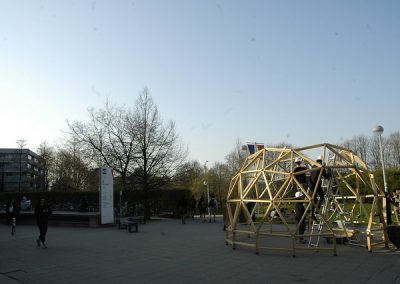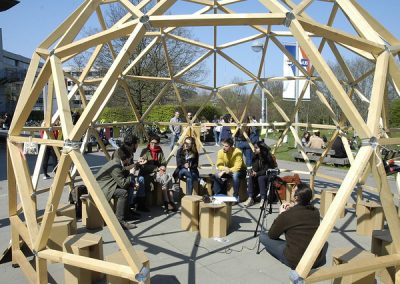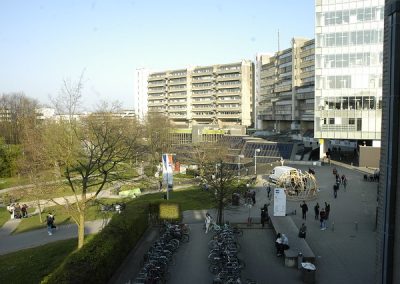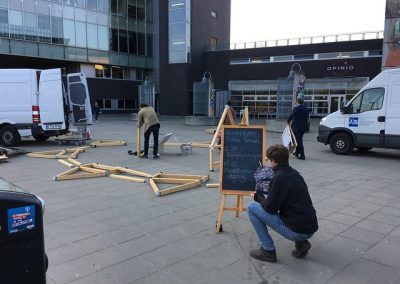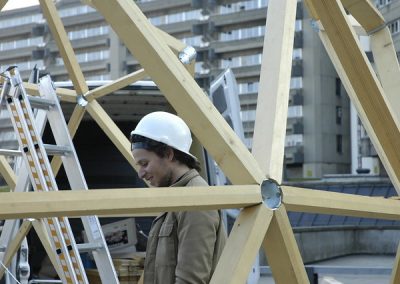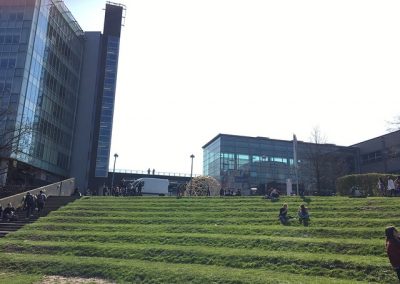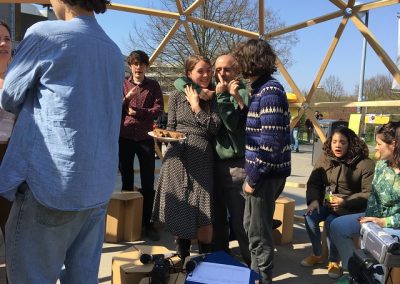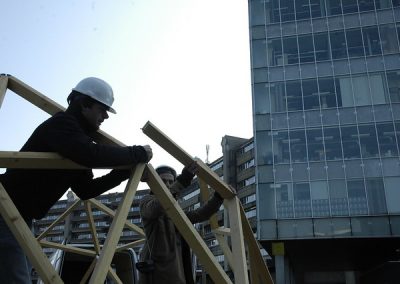Brussels – Studying Citizen Participation and Sustainability
Brussels| In the capital of Europe we held our second dome talk in Belgium. In the light of the upcoming European elections we visited the future academics of Europe – the students of the University of Brussels. Brussels is the city of diversity with 3 languages spoken and many more European natives among the citizens of the city. Thus, we hoped for diverse participants and we were not disappointed: Germany, Italy, Serbia, Belgium, Portugal, France, Russia, Spain. All those countries were sitting under the roof of the dome and vividly discussed over the future of Europe and beyond, as we also had non-European perspectives and ideas included. David Reich reports about the day in Brussels.
The day started cold but sunny, so we were freezing but motivated while focusing on building the dome in time. Maarten, a Dutch colleague living and working in Brussels, helped us build the dome. It was a German/Dutch co-production and within 3 hours we managed to construct Europe. The building process ended, and the sun finally shone onto the Dome, which gave us some more warmth and energy to proceed with the talks. Unfortunately people were rather busy and it was difficult to lure them into our beautiful dome.
With some starting problems, the first talk kicked off 20 minutes later than expected, with 4 enthusiastic and informed participants and Veronique a local who helped us moderate the talk. On the left side we had two Italian master students who were familiar with the topic. Their familiarity with the topic was a great asset, as they work and study on topics related to civil society and civic participation.

Lively discussions under the dome in Brussels
“The idea of a dome replicates a bit the challenges of European citizens participation – there are a lot of citizens around but not many of them inside our public sphere – we call them citizens but can we actually call them citizens even though they are not participating fully.”
Starting slowly on the meaning of a citizen, the discussion went on, ending up in a problem analysis on “why the citizen is inactive” and “how to resolve this frustration”. Answers were given, people might be too alienated from their European institutions and the EU does a bad job at diffusing information and connecting to its people.Thus, the conclusion was to take self-responsibility and act. Also through the means of the new medias since the public as it exists now is rather inactive and it is difficult thrill it for politics– one conclusion was that people are rather alienated from politics, live in their individualistic bubble and have thus difficulties to connect with one another. For citizens’ initiatives, it was concluded that we must take action and we must be supported in our action, either through the institutions or through collective actions. Also the topic of e-citizens’ initiatives was touched upon, which could overcome the current inactivity of certain people in the public sphere.
The second talk was held in the same spot with a diverse group of students. We had two people from Germany, one person who is half Belgian and half Portuguese, a Spanish student, one American and later a Russian exchange student joined into the debate at a later stage of the discusion. The Italian student who already partook in the first talk joined again. The discussion started calmly and rather simplistic, as we discussed the meaning of climate change. Everyone agreed that the changing climate is something that is observable throughout all of human history and that is unavoidable. The problem-analysis went so far as to say that we as the current human species are the reason for this drastic change. Starting with the industrial revolution, we can observe a drastic increase in emissions, which are man-made.
Video of the first Dome Talk at VUB in Brussels
Moreover, there is a tendency of drastic climate catastrophes to observe, which is also tightly linked to our actions, as humans started interfering into nature by cutting down trees, by domiciling cattle in abundance (which leads to a intoxication of our grounds and airs), by building towns closer and closer to rivers that have the tendency to flood (and in this regard we pollute through our industries), and by many more problematic actions. This brought us to the conclusion that the problems are man-made and if we don’t act in time we might be doomed sooner than later. We must act and not wait was the motto of many – cut down emissions through green energies, recycle, and find alternative energies and resources to use for our daily lives. Even the idea of terraforming the Sahara was mentioned (also including Negev desert in Israel, which is already an example for successful terraforming), in order to make ground more fertile and to create alternative spaces, where people can live and create a new living space, as more and more grounds are eroded or dried out by too hot temperatures. Interestingly, the Russian speaker even said that people in Russia could benefit from climate change, since a trade route on the coast of Siberia opened up – so there are not only people complaining and worrying about the situation, but also welcoming the changes. This opposition summarizes the interesting part of the open debate on climate – it is a collision of the most diverse and contradicting points of view and we seem to be in need of them to be able to make progress and bring a change.

After 2 hours we terminated the talk and started building down the dome. In rather philosophical terms, the dome and Europe can be seen as constructivist and deconstructivist projects. In order to change something you need to find the flaws and ameliorate them, rather than remaining with the status quo. This argumentation was also mentioned in the talks– there were many calls for a systemic change with regard to the EU institutions, which could lead to a better Europe that is capable to resolve complex issues. Especially topics like climate and European civic participation need a constant and constructive narrative, otherwise the European project is doomed to fail. Moreover, it was agreed upon that we need to create a European public sphere, rather than a national one. Nationalism does not have answers for these complexities and rather looks for easy solutions which are often not working sufficiently.
What I also took from this talk is that young people wish for more participation in these complex processes; we as young people also have the abilities to understand the complex globalised world, rather than just the politicians in charge. We have a voice and we want it to be heard – only a solid civil society can get the stone rolling, especially with regard to tackling and avoiding climate catastrophes. We need a government for, by and with the people, as a student has said (and also Lincoln during the American Revolution). For me, this was one of the most interesting sentences dropped, namely further underlining our motivation and intention for the future – we want inclusive and representative politics that is built upon human rights, solidarity and empathy as core values. All students agreed that only through a common value system that includes justice and equality we will be able to succeed.
Video of our 4 stops in Belgium

It was great to see all those students sitting together and discussing the problems but certainly also solutions for a better future. In the end, I saw a lot of motivated people who are ready to act. It seemed like a call for action. Even though not everyone seemed completely optimistic, especially the people I talked to outside the dome, they at least all agreed about the fact that we need to take firm actions and cooperate on a broader scale. A student from Belgium was so interested in the project that he decided to help us deconstruct the dome; he is a philosopher and strives for similar goals as we do. To talk with the people and educate them – that doesn’t mean to show them what is right and wrong, but to rather get into a discussion with them and to formulate ideas and visions. Only through togetherness will we be able to overcome the problems that we are currently facing.
Our spontaneous ‘apprentice’ and participant Kevin
We then stayed in Brussels for another day to visit the Economic and Social Committee. In the committee we partook in the ECI day, together with parliamentarians, commissioners and other experts from civil society organizations.
All in all, a very eventful trip to the capital of Europe. I enjoyed my first Public Sphere event to the fullest and it was especially nice to have spoken to many different people who feel that politics, and more specifically democracy and civil society, are important and need to be protected and promoted.

